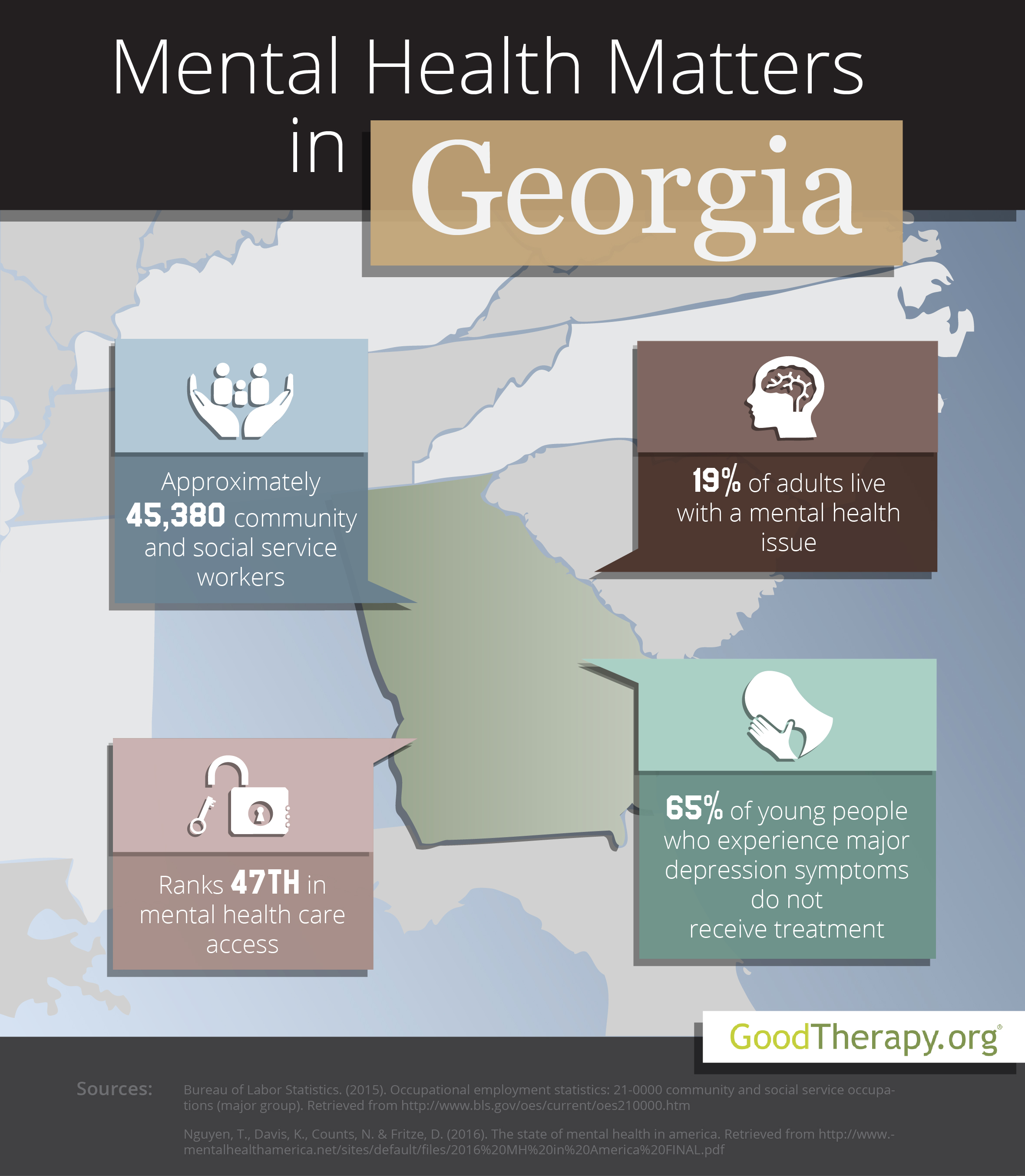Find a Therapist in Georgia
Welcome to the Georgia therapist directory at GoodTherapy.org. Our directory is the fastest and safest way to find a good counselor or therapist in Georgia cities. We only include professional therapists, counselors, and psychologists whose work accords, in attitude and orientation, to the elements of good therapy. Find a therapist or counselor in your Georgia zip code, or click on the links below to see the counselors in your city. If you are looking for telehealth therapy you can click here to see all Georgia telehealth therapists.
Carroll County
Chatham County
Cherokee County
Clayton County
Cobb County
Dekalb County
Douglas County
Fayette County
Forsyth County
Fulton County
Gwinnett County
Hall County
Newton County
Rockdale County
Mental Health Matters in Georgia
Statistical data gathered and presented by the Bureau of Labor Statistics (BLS) shows that in 2015, roughly 45,380 people were employed as child psychologists, clinical social workers, psychiatrists, residential treatment center counselors, counselors at drug and alcohol rehab centers, parole officers, religious workers, health educators, and marriage and family therapists in Georgia. People who worked in these community or social service occupations earned a an average annual salary of $44,150 and served approximately 10.2 million Georgia residents in 2015.
 Mental Health in Georgia
Mental Health in Georgia
After being ranked alongside all states and the District of Columbia in Mental Health America’s (MHA) 2016 survey, the state of Georgia was listed 18th overall in mental health conditions and practices. Georgia was also evaluated in several specific mental health categories. The state was 1st in prevalence ranking, indicating a low rate of mental health concerns experienced among residents. However, Georgia was 47th in access to mental health care ranking, which suggests residents with adverse mental health conditions will likely face barriers when trying to obtain the mental health services they need.
Researchers have identified a number of social and economic factors that may have impacted the state’s prevalence and access to care rankings. According to the 2016 MHA report, Georgia’s very low prevalence of mental health issues correlates with low rates of child maltreatment within the state; on the other hand, Georgia’s access to care ranking correlates with low rates of graduation from high school, higher rates than normal of toxic chemical release, high rates of unemployment, and high rates of poverty in the state.
At about 7.5%, Georgia has the second lowest percentage of adults with dependence on drugs and alcohol in the country. A little more than 3% of adults in the state have serious thoughts of suicide—the sixth-lowest percentage nationwide. Georgia also received top rankings in several mental health measures for young people—placing 4th for adolescents with at least one past year episode of major depression; 10th for adolescents with alcohol and drug abuse issues; and 2nd for young people with severe episodes of major depression. These ranking coincide with Georgia’s overall low prevalence of mental health issues.
The 2016 MHA report ranks the state as 46th for adults with mental health issues who did not receive treatment; 47th for adults with mental health issues who are uninsured; 50th for adults with disabilities who could not see a doctor due to cost; 47th for young people with severe symptoms of major depression who received some consistent treatment; 44th for children with private insurance that did not cover mental health issues; and 48th in mental health workforce availability. These are all low rankings that indicate there is much work to be done in mental health care in Georgia.
References:
-
Bureau of Labor Statistics. (2015). Occupational employment statistics: 21-0000 community and social service occupations (major group). Retrieved from http://www.bls.gov/oes/current/oes210000.htm
-
Nguyen, T., Davis, K., Counts, N. & Fritze, D. (2016). The state of mental health in America. Retrieved from http://www.mentalhealthamerica.net/sites/default/files/2016%20MH%20in%20America%20FINAL.pdf
-
United States Census Bureau. (2015). Quick facts: Georgia. Retrieved from http://www.census.gov/quickfacts/table/PST045215/13
Advanced Search | Browse Locations | International Search